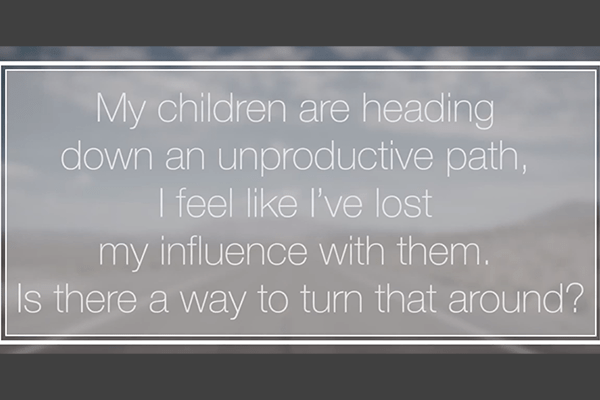Let’s face it: most advice about success is bad.
After all, if most of it were good, you and I would have to assume—given the sheer volume of advice on the topic a person can access at the click of a button—there would be a lot more successful people in the world today.
But as we both know, that is not the case.
Unfortunately, despite the good intentions, most advice about success suffers from one fatal flaw…
It’s built around a shortsighted definition of what success really is.
Society is quick to tell you that success means having a:
- Nice car
- Huge house
- Boat
- Large travel budget
We cling to things like this as indicators of success because they’re so easily visible. Over time, we develop tunnel vision about them, blinding ourselves to the possibility of pursuing things that actually make a lasting difference.
Things like:
- Your legacy
- Your level of influence
- Spending time with your family
- Your ability to give to those in need
So when searching for the keys to success, it’s important to take advice with a grain of salt. Be aware that most of it is designed to help you obtain more things rather than making more of an impact.
If, as I suspect, success means more to you than the kind of car in your driveway, I encourage you to keep reading.
This list is built to help you do two things:
- Determine what success looks like in your life
- Give you actionable steps to achieving it
I discovered each of these steps during my time studying the lives of thousands of history’s greatest achievers. No matter their area of expertise, they all had similar habits and beliefs that helped them produce incredible results.
Wait: Keep This Question in Mind As You Read the Keys to Success
Before we go any further, there’s one more important thing you need to know about the definition of success:
There is no one definition.
That’s why it’s critical that you define what it looks like to you.
Otherwise, you’ll be starting a journey without a destination. And without a destination, you’ll have no idea where to go, how to prepare, or if you’re even on the right track.
So, instead of simply asking, “What does success look like for me?” I want you to make a slight change to the question.
Ask yourself, “What would a successful life look like for me?”
To get your mind jogging, here are a few follow-up questions that can help you paint a mental picture of your successful life:
- What kind of legacy do I want to leave behind? What will people say when they describe my life?
- How much influence do I want and what will I do with it?
- Who do I want to impact and how will I go about it?
- How much time do I want to spend with my family?
You don’t need a definitive answer before you read any further, but keep this in mind as you continue. Once you can define your successful life, these seven keys to success will give you a blueprint to living it.
7 Keys to Living a Successful Life
1. Discipline
Most of us have trained our brains to have a negative connotation with this word. We think of discipline as punishment or as making ourselves do something we don’t want to do.
But I urge you to change the way you think about it…
Think about discipline as something you may not like doing, but have the opportunity to do in order to get the results you would like to have.
Take reading for example—most adults either don’t like reading or think they don’t have time for it.
But statistics show that people who read:
- Make more money than people who don’t
- Have a lower divorce rate than people who don’t
- Have fewer problems with their children than people who don’t
- Get promoted at a higher rate than people who don’t
- Get hired at a higher rate than people who don’t
Are you after those results? Then it really doesn’t matter if you like reading or not, does it? Because the results you are after in your life have very little to do with what you don’t like. In fact, forget what you don’t like. This is about WHAT. DO. YOU. WANT?
From now on, I encourage you to think of discipline in this way:
- What do I really want?
- What results would totally change my life and the lives of those I care about the most?
- Is it worth doing something I don’t want to do for relatively small chunks of time in order to achieve those results?
Without discipline, a successful life is impossible to reach.
The ongoing process of learning what you need to learn in order to do something with extraordinary excellence is often grueling and repetitive.
You need discipline to keep yourself moving toward the life you want to live during those times that don’t seem to be producing immediate results.
Because the truth is this: success is an incremental realization of a worthwhile dream or goal—not a destination.
2. Persistence (Without Exception)
I used to get frustrated when an interviewer would ask me to quickly run through the Seven Decisions from The Traveler’s Gift.
Not because I didn’t want to explain it, but because the seventh and most important decision—“I will persist without exception”—is frequently misinterpreted.
You and I understand what it means to persist: to hang in there even when things get tough. We’ve been taught to give things our best shot and keep fighting for as long as we can.
So when people hear the phrase “persist without exception,” they think they already understand what it means.
But they usually forget the “without exception” part.
It’s not because they’re quitters—it’s because when things aren’t going well, they think they should change direction.
Think about it…
Often times when we’re in the middle of persisting and things aren’t going well, it makes us think:
“Is this really worth doing?”
And most people decide it isn’t, so they change course.
But if what you’re doing moves you closer to your definition of a successful life, you can’t afford to change course.
You must persist—despite how hard it is or how hopeless it may seem—so you can live the life you were made to live.
I learned this the hard way…
The Traveler’s Gift was rejected 51 times before it finally got published.
During that process, I constantly questioned if I was supposed to keep trying or if I was wasting my time. But since what I was doing aligned with my definition of a successful life, I decided to press on.
The fact that I wasn’t getting traction wasn’t a sign that I should quit—it was simply a sign that I needed to start changing tactics if I wanted to change my results.
So I started asking different questions and looking for answers in different places.
Instead of asking myself, “What publisher should I send my manuscript to?” I started asking, “How can I make sure a publisher reads my manuscript?”
Then the answer dawned on me.
The best way to ensure that a publisher would read my manuscript wasn’t sending it to them directly…
It was sending it to their spouse.
At a dinner party, I gave a copy of my manuscript to the publisher’s wife. After she stayed up all night reading it cover to cover, he finally took notice.
And on the 52nd try, The Traveler’s Gift got published and eventually reached the New York Times bestseller list.
If what you’re doing aligns with your definition of a successful life, you must persist without exception.
Find a way where there is no way.
3. Influence
Think for a moment about the most influential person you know.
It could be someone in your community, a family member, or even a friend.
What do you think would happen to this person if they suddenly lost their money?
How long would it take them to get moving? Would they have trouble finding opportunity?
I’m willing to bet they wouldn’t be financially devastated for long…
Why?
Influential people have a greater impact on others. Because of their value to other people, they have more connections and subsequently receive more opportunities.
It doesn’t matter how you define success, being influential will make things much easier on you.
Unfortunately, many people get squeamish at the first mention of the word “influence.”
It brings to mind cheap psychological tricks used to manipulate people and play on their emotions.
But the reality is that positively influencing someone has nothing to do with manipulation.
In fact, it’s much more about making changes to your own behavior than trying to make people do what you want them to do.
If you acquire and hone these four overlooked skills, you’ll be well on your way to positively influencing people you meet each and every day:
- Being someone others want to be around
At the end of the day, this simple quality is the most important determinant of whether you’ll be influential or not. If people don’t want to be around you, it’s going to be tough for you to lead them anywhere.
Fortunately, becoming someone others want to be around isn’t complicated. I’ve spoken at length about how simply smiling while you talk can make an incredible difference in the conversations you have every day. But beyond that, focus on these three qualities specifically:
- Positivity: When you think about people you love being around, chances are they’re not “glass half empty” type people. The most influential people are positive by choice, and understand how to balance it appropriately with realism rather than negativity.
- Respect: Demonstrating respect for everyone with whom you interact is not only the right thing to do, it’s also the easiest way for others to observe your character in action. Which is exactly why respect is an overlooked superpower for influence.
- Engaging: This third point is perhaps the most intimidating—learning to be an engaging conversationalist. But the key word there is “learning.” Because, despite what you may think, you do not have to be born a gifted speaker or even be an extrovert to master the art of conversation. For specific steps on how to improve, read my in-depth post on influence here.
- Understanding the components of change
If you want to influence positive change, you have to let go of the three common myths society believes about change:
Myth #1: “It takes time to change.”
Myth #2: “You have to want to change.”
Myth #3: “Change can only happen when you hit rock bottom.”
In reality, these myths are totally obliterated when two things are made clear:
- The person who needs to change understands “what’s in it for them.”
- The person has proof beyond a reasonable doubt that they should change.
If you master the ability to clearly communicate those two things, your ability to positively influence change in others (and even yourself) will skyrocket.
- Harnessing the power of storytelling
Since stories connect in a way regular information can’t, you can use its power to help people change their perspective and take action.
A well-told story can illuminate lessons, principles, and insights in entirely new ways that help people instantly understand something they’ve been missing their entire lives.
Look for stories from your own life that can provide that connection with your audience.
- Learning how to network the right way
Next to becoming a better conversationalist, this is probably the skill that gives people the most pause.
And it’s easy to see why—who doesn’t hate “networking,” after all?
But there’s so much more to networking than the traditional things that come to mind, like going to a Chamber of Commerce meeting and handing out business cards. Rather than getting trapped in the traditional networking “tactics” that make you want to avoid every public meetup you see, try a different approach.
When you walk into a room of people, instead of asking who might be able to help you, ask things like:
- What do I want to learn?
- Who might I be able to help?
- How can I build friendships rather than contacts?
Maybe one day the connections you’ll make will pay off. Today, however, look at them only as new friends.
4. Coaching
There are several things we can learn from society’s top achievers, but one secret in particular stands out from the rest:
Almost all of them invest in some form of personal coaching.
They realize that with the right kind of coaching, they can double their production and results across nearly every aspect of their life.
But a curious thing happens when you talk to people about the importance of coaching…
Although they’re quick to agree that coaches and advisors are critically important to everything from sports teams to businesses, they fail to acknowledge that coaching can be just as valuable for their own lives.
While there’s not really any such thing as a “shortcut” to success, there are certainly things that make the process less painful! Coaching is one of them.
And if you think you can’t afford it think again.
There are many ways to get coaching, and some of them are free:
- Develop a personal board of directors
While your own personal board of directors might sound expensive, you can actually set one up absolutely free of cost.
How? You only need two things:
- People in your life whom you would describe as wise
- People in your life who have achieved results (personal or professional) you would like to have
If any names come to mind, congratulations—you have a personal board of directors! No formal process is necessary. The members of your board don’t even need to know they’re on it. They do not need to meet quarterly at a large conference table.
All you need to do is watch, listen, and ask questions. Use these people as sounding boards. When you’re around them, come ready to ask specific questions.
This method doesn’t cost anything and requires only paying attention to people who already are where you want to be.
- Read books
Some of the best coaching I’ve ever received cost less than $20, didn’t speak a word, and sat on my nightstand.
Sure, personalized feedback is great, but never discount the insights you can gain from reading the right books at the right time. Read often and you’ll find them.
- Hire a personal coach
Hiring a personal coach can be a game changer. It’s hard to give specific tips for doing this since the options available to people depending on their financial situations vary so much, but my one piece of advice for everyone would be this:
Look for someone who gives you things you can take and actually use in your life, rather than one who simply gives you emotional fuel.
As someone who has both coached others and been coached, trust me—that is the critical factor that separates the coaches who are actually worth their cost.
- Join a mastermind group or private coaching community
Whether you can hire a personal coach or not, this is another excellent option. A group of like-minded peers who are after similar results can keep you accountable and engaged as you work through the inevitable ups and downs of success.
5. Having a Personal Mission Statement
Imagine how difficult it would be to build a house without a blueprint.
You’d have to design the layout as you go, which would inevitably lead to all kinds of delays and hiccups.
And when it’s all said and done, the end result would likely be much different than what you originally had in mind.
The same can be said about trying to live a successful life without a mission statement.
A personal mission statement is the blueprint for achieving your definition of a successful life.
It keeps you aligned with your core values and guides you toward the life you want to live—making every decision you’ll ever face much easier.
That’s why nearly every business and high achiever has some sort of mission statement.
A Personal Mission Statement establishes boundaries that will protect your time, money, and assets.
Take mine for example:
My mission is to help others live the lives they would if they only knew how.
If something I’m considering doing doesn’t align with this mission, I don’t do it. Plain and simple.
For a detailed guide on how to craft your personal mission statement, click here.
6. Belief
Over and over again, it’s been proven that it’s impossible to achieve anything that lies beyond what you believe yourself capable of doing.
So when I surveyed members of my email list about the number one thing preventing them from reaching their goals, and the responses overwhelmingly cited a lack of belief or confidence, I knew there was a problem.
As important as belief is, we all struggle with it. But that doesn’t mean the struggle has to be endless.
Increasing the belief you have in yourself starts with understanding three foundational truths:
- Your belief comes from your thinking. Every choice you’ll ever make is determined by how you think. Fortunately, it’s possible to direct your thinking.
- You direct your thinking by what you seek…or don’t. Your thinking determines your strength of belief, your lack of belief, your struggle with belief, and your absolute belief. The beautiful thing is you direct your beliefs the same way you direct your thinking—by CHOOSING the things you watch, read, listen to, and give your focus. Choose wisely.
- You must guard your thinking. YOU are the guard who admits or turns away the people, things, or activities that will negatively influence your thinking. It’s on you to set boundaries for what you will and will not accept into your life.
Every choice you make is determined by what you think, how you think, and how long you think about it.
If you learn how to direct and guard your thoughts, you can ultimately take control of your thinking and increase your level of belief.
For more practice at this (because we all need it), check out the full post I wrote on “Increasing Your Belief in Yourself” here.
7. Goal Setting
When we decide we want a better life, what is the first thing we usually do?
We look for “best practices.” For the tips, tools, and strategies that have worked for everyone else.
For the “keys to success,” if you will. 🙂
And while these things are helpful (I wouldn’t have written this blog post about them if I didn’t believe they’d help), it’s easy to let them shroud the most important ingredient in creating your ideal life.
Do you remember what that is?
It’s the question I told you to keep in mind at the beginning of this post: “What would a successful life look like for me?”
The answer to this question gives you your destination. And starting with your destination in mind will put you miles ahead of the vast majority of people who set goals and never achieve meaningful progress.
Rather than letting methods determine your destination, let your destination determine your methods.
While I’ve listed seven keys to success in this post, the reality is that you need to know what your destination is before you can determine which of these keys will be most vital for you to master first.
Instead of viewing them as a step-by-step plan, see them as a set of tools you can use in a variety of different ways (and at different times) to create the methods you will need to follow to create your ideal life. Because when it comes to creating your life, there is no step-by-step plan. It is uniquely yours. The plan is being written as you live it.
Remember: Success Is a Process
There will be times when you get discouraged. You’ll feel like you aren’t making any progress. You might even question if it’s worth continuing.
When you do, remember this:
Success is not a destination; it’s a process.
Most people jump ship when they aren’t seeing progress. They get discouraged and decide to change course.
But don’t take the bumps in the road as signs that you’re headed in the wrong direction. They’re a requirement of any journey worth taking.
Stay the course.
Focus on the process of becoming the person you were created to be.












